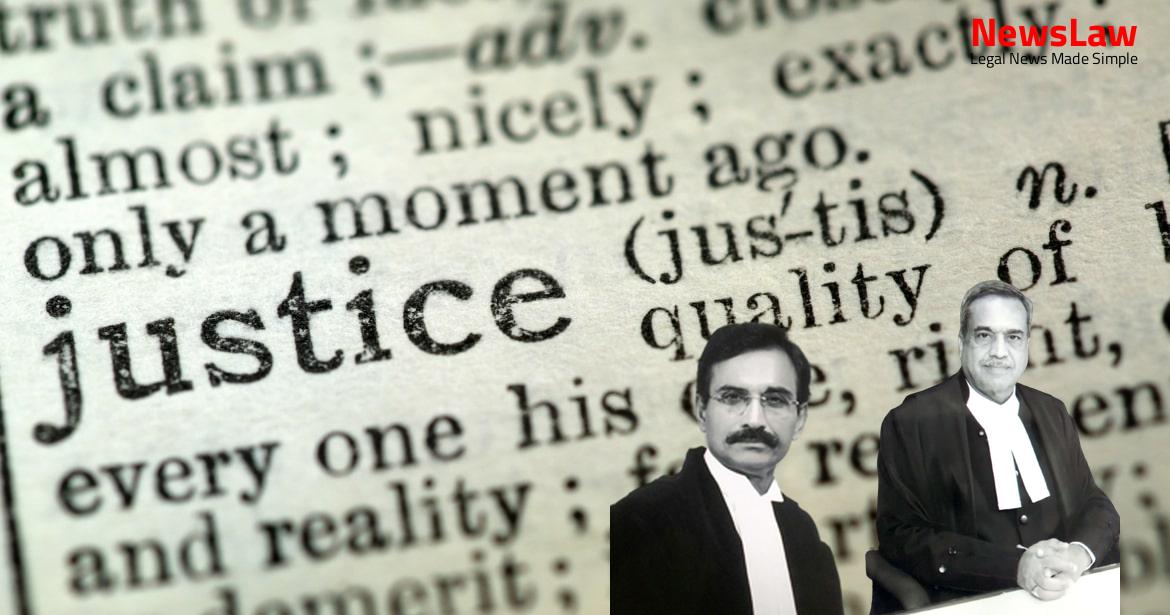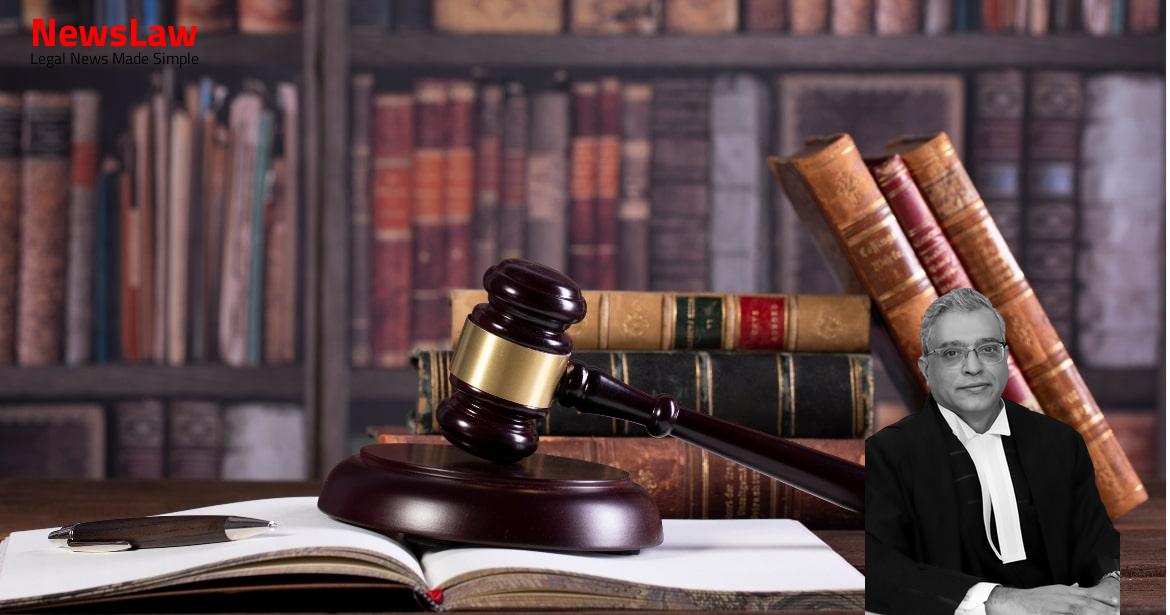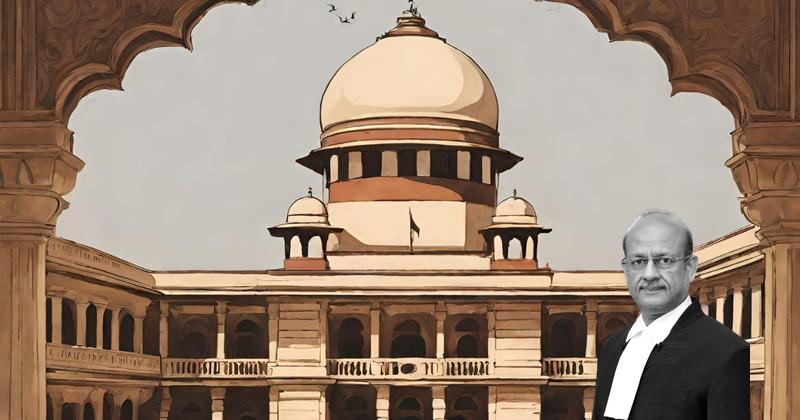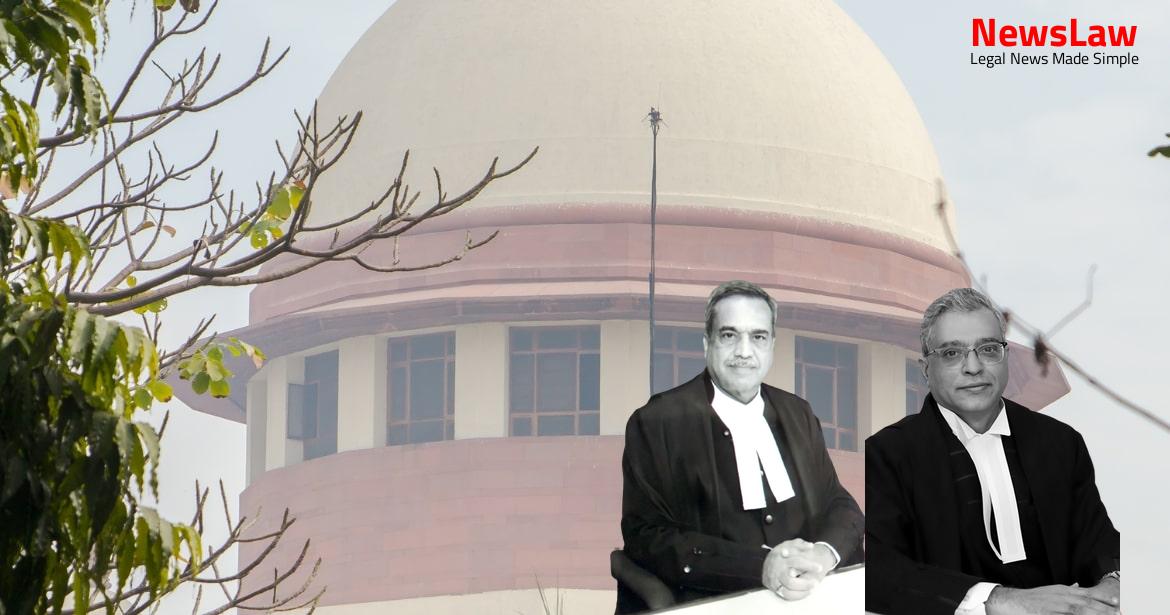In a significant legal battle over land ownership, the Supreme Court of India has delivered a crucial verdict. The case involves a dispute regarding the ownership and possession of a piece of land, with implications stemming from a family settlement dated 23.04.1971. The judgment sheds light on the intricacies of property rights and the validity of unregistered documents in such disputes.
Facts
- The Trial Court observed and held that there was a partition between the family on 23.4.1971.
- The Trial Court considered Exhibit D4 (Partition Deed dated 23.04.1971) as admissible in evidence.
- The First Appellate Court dismissed the appeal and confirmed the Trial Court’s decision, stating that Exhibit D4 is not a Partition Deed but a list of properties partitioned.
- The First Appellate Court deemed Exhibit D4 as not creating or extinguishing any right in the immovable property, hence not mandatorily registrable.
- The Original Plaintiff filed a Second Appeal before the High Court, questioning ownership and possession of the suit land acquired in 1973, post a supposed partition deed on 23.4.1971.
- On appeal, the High Court allowed the appeal, setting aside the lower court judgments and decreeing the suit in favor of the original plaintiff.
- The Trial Court found concealment of material facts in the suit, indicating the plaintiff’s mala fide intention.
- The Trial Court also mentioned a sham document executed in favor of the plaintiff, allegedly in collusion with a witness.
- The Trial Court considered Exhibit P1 (Sale Deed) as only nominal and executed as security for a loan, not intended for actual sale of the property.
- The Trial Court noted the improbability of the property being sold for a meager price after 16 years of purchase.
- The partition between the sons of deceased Nanjappa was recorded on 23.04.1971, and the suit property fell into the share of the deceased A. N. Krishnappa.
- The defendants claimed that no Sale Deed was executed by them in favor of the plaintiff and alleged the Sale Deed provided by the plaintiff was fabricated.
- Both parties presented oral and documentary evidence during the case.
- The defendants stated they were enjoying possession of the suit property.
- It was argued by the defendants that A. N. Krishnappa purchased the suit property on 12.12.1948 under a registered Sale Deed for Rs.400.
- The suit was opposed by the defendants through a written statement.
Also Read: Supreme Court Ruling on Dowry Harassment and Suicide Case
Issue
- The High Court framed a substantial question of law regarding the ownership and possession of the suit land by the appellant.
- The Trial Court had framed issues related to the plaintiff’s title, lawful possession, and interference by the defendants regarding the suit property.
- The main focus of the appeal is on whether the appellant is the rightful owner and possessor of the land, considering the Partition deed that is alleged to have come into existence in 1971.
Also Read: Case of Technical Equipment Officer Appointment Criteria Dispute
Arguments
- The petitioner argues that the family settlement, even if not registered, operates as a complete estoppel against the original plaintiff as per the decision in Kale v. Deputy Director of Consolidation.
- The High Court erred in not giving effect to the Doctrine of Estoppel.
- The petitioner emphasizes the importance of registration in property transfers, citing various cases and stating that registration is prima facie proof of intent but not of transfer.
- The Sale Deeds in favor of the original plaintiff were not challenged by the defendants, thus according to Section 54 of the Transfer of Property Act, the plaintiff became the absolute owner.
- The petitioner disputes the High Court’s interference with the findings of facts regarding the Sale Deed and its execution, arguing that Exhibit P1 was a nominal Sale Deed.
- The petitioner challenges the High Court’s view on the unregistered Partition Deed and its admissibility as evidence.
- The High Court’s decision on the suit property’s availability for partition in 1971 is contested by the petitioner.
- The petitioner argues that the High Court exceeded its jurisdiction in interfering with the findings of the lower courts.
- Document D4 is considered by the petitioner to be admissible for corroborative evidence even if it required registration.
- The plaintiff’s title to the suit property is upheld by the petitioner based on the registered Sale Deeds.
- The High Court’s judgement on the admissibility of Exhibit D4 as evidence is challenged by the petitioner.
- The defendants’ failure to challenge the Sale Deeds is highlighted by the petitioner as supporting the plaintiff’s ownership claim.
- Property sold before alleged partition in 1971, making it invalid for partition.
- No acquisition of interest by Krishnappa in the suit property in 1971.
- Suit property not available for partition due to earlier Sale Deed in 1964.
Also Read: Supreme Court Judgement on Transfer of Mining Environmental Clearances
Analysis
- The plaintiff admitted in cross-examination that Exhibit P1 was not signed by Krishnappa, making it not binding on him or his heirs.
- The suit property was purchased by Krishnappa in 1948 and later thrown into joint family property in 1952.
- The High Court exceeded its jurisdiction by not considering important documents like Exhibit D4 dated 23.04.1971.
- The Sale Deed dated 22.06.1964 and subsequent deeds were found to be sham by the Trial Court and First Appellate Court.
- The High Court’s decision to decree the suit without considering the evidence presented by both parties was deemed a manifest error.
- The plaintiff’s admission of an oral partition in 1971 contradicted his claims in the suit.
- The High Court’s decision to disregard the unregistered Partition Deed dated 23.04.1971 was criticized, as it was a significant piece of evidence.
- In cases of family settlements, even without registration, they can operate as a complete estoppel against the parties involved.
- The Sale Deed executed in favor of the plaintiff was questioned by the defendants as nominal, unbinding, and not acted upon.
- Overall, the High Court’s intervention in reversing the findings of fact without a substantial question of law was seen as an error.
- Under Section 100 CPC, after the 1976 amendment, the High Court must formulate a substantial question of law before reversing the judgment of the first appellate court.
- Interference with findings of fact is permissible when material evidence is not considered which would have led to an opposite conclusion.
- A person cannot go back on an agreement made with full knowledge of his rights as a possible reversioner when the reversion falls open.
- The view expressed by the Privy Council in Lal Achal Ram case is not subscribed to, but the law laid down by the Calcutta, Patna, and Orissa High Courts is approved.
- A written document of family settlement/arrangement can be used as corroborative evidence to explain the arrangement and conduct of the parties even without registration.
- In Second Appeal under Section 100 of the CPC, the High Court cannot substitute its opinion for that of the First Appellate Court unless the lower court’s conclusions are erroneous due to specific reasons like being contrary to applicable law, law as pronounced by the Apex Court, or based on inadmissible or no evidence.
- The High Court was not justified in interfering with the findings recorded by both the Courts below.
- The impugned Judgment and Order passed by the High Court cannot be sustained.
- It deserves to be quashed and set aside.
- There is a serious dispute regarding the consideration paid by the plaintiff and received by Siddalingappa.
Decision
- The Judgment and Order passed by both the Courts below dismissing the suit are restored.
- The suit filed by the original plaintiff is dismissed.
- No costs are awarded.
Case Title: THULASIDHARA Vs. NARAYANAPPA
Case Number: C.A. No.-000784-000784 / 2010



